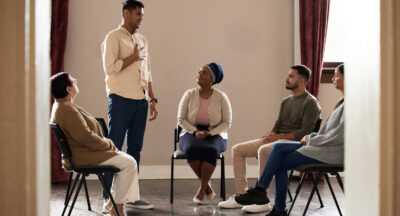
Functional family therapy for young people in legal trouble
We live in a historic moment for our children and youth, with public policies to identify alternatives that promote minor well-being and comprehensive development. As a fundamental part of this process, during the summer of 2022, the Puerto Rico Minors Act (Act 88-1986) was reformed, establishing 13 years as the minimum age for minor prosecution and adding mediation processes for conflict resolution, promoting less punitive alternatives. Collaboration between government agencies and third-sector organizations is required to make these provisions effective, activate resources, and promote initiatives aimed at young people interacting with the justice system. At this juncture, it is necessary to provide prevention and service alternatives.
Science has already documented that adverse experiences in childhood can increase the risk of engaging in transgressive behaviors in adulthood (Abrams, 2022). In Puerto Rico, 57% of minors live below the poverty level, and according to the Youth Institute (2019), the cost of crime attributed to child poverty can be close to $1,072 million. Data from the Puerto Rico Police indicate that the average age of young people who commit reported criminal behavior is 16 years (Office for Socioeconomic and Community Development, 2021). In many instances, minors who begin to have conflicts with the law come from adverse contexts and experiences.
According to a report from the Puerto Rico Department of Justice (2015) on the risk factors of young people who were found involved in a crime, 52.4% come from homes with economic problems, 13.9% have been victims of some experience of abuse (physical, emotional or sexual abuse), 12.7% reported dropping out of school between sixth and ninth grade, and 48.3% presented diagnoses related to emotional disturbances. Most of these young people were found guilty of less serious crimes.
On the other hand, the Puerto Rico Department of Correction and Rehabilitation (2021) reported that 53% of young people who are located in juvenile institutions have some neurodevelopmental disorder, 29% have been victims of human trafficking before admission, 44% presented indicators of sadness or hopelessness, and 9% reported a suicide attempt that was not treated at the time. All of these data suggest that before interacting with the juvenile justice system, these young people have faced experiences and risk factors that undoubtedly merit attention with prevention initiatives. But services are also needed to support the rehabilitation and reintegration into the community of youth who have already conflicted with the law.
Functional Family Therapy (FFT) is precisely focused on these areas. It offers an intensive, short-term, evidence-based intervention that effectively reduces criminal behavior in children and youth. This model is family-centered and focused on its strengths. It seeks to work with family members on communication processes, behavior change, negotiation strategies, and ways to maintain positive changes in behavior. It should be noted that the Administration of Families and Children (ADFAN) will provide this intervention to young people under its custody, according to Act 88-1986, as part of the Title IV-E 2021-2024 Prevention Plan.
Steps must be taken to expand this type of intervention to other youth who also interact with the juvenile justice system. In Puerto Rico, we already have Act 66-2011, which provides for creating a Pilot Program on Functional Family Therapy with young people in the custody of Youth Institutions. Currently, as part of the meetings of the juvenile justice system representatives, which began in October 2022, the implementation of this pilot is being designed. It is a significant step forward because it focuses on how we serve our youth. Functional Family Therapy can help address situations related to family functioning, improve interpersonal relationships, develop conflict resolution skills, and learn to manage stress and anger, among others. Work is ahead, and we are focused on activating, facilitating, and promoting ongoing services that improve the well-being of youth involved with the juvenile justice system and their families.
Authored by: Dr. Cristina Adames, evidence-based practices specialist and project director at Grupo Nexos, Inc.
Related Posts
Culture of support needed for social workers
The discussion around how to break stigmas and support the well-being of an...
Mental health professionals urge a comprehensive look at the needs of children and youth in Puerto Rico
(Mayagüez, PR) - Adopting a broad human rights perspective on the development...
Dialogue to create joint efforts against juvenile delinquency
The “Puerto Rico Minors Act” (Act 88-1986) was recently reformed. In this...
Functional family therapy for young people in legal trouble
We live in a historic moment for our children and youth, with public policies to...




